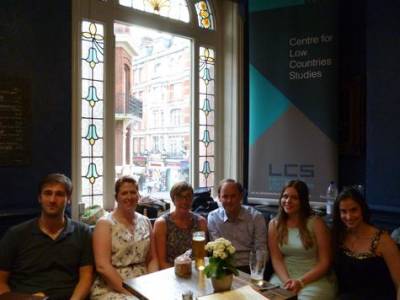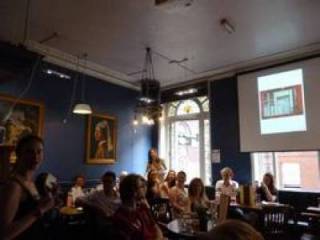Ruth Clemens on Dutch Encounters
On the evening of Wednesday the 1st of July a crowd gathered in London's only Dutch pub De Hems, whose history can be traced to 1890. As well as refreshing pints of Dutch lager or Trappist ale, the crowd was treated to a series of provocative and engaging talks about Dutch cultural stereotypes - with complimentary stroopwafels. This was 'Dutch Encounters', an evening of cultural exploration organized by UCL's Centre for Low Countries Studies and supported by a UCL Beacon Bursary.

15 October 2019
After a brief introduction, UCL Honorary Research Associate Nick Piercey kicked off the debate by attempting to answer this question: Why do the Dutch love bicycles? He began by asking whether any of us had nearly been run over by a cyclist as a tourist in Amsterdam. Almost the whole room raised their hands, amongst rising laughter. His talk led us through a chronological history of the humble bicycle as a symbol of Dutch national pride, whether as a means of liberation for women at the turn of the century or as a way for ordinary people to travel freely, autonomously, and cheaply across the smooth Dutch landscape.
MA Student at UCL Aimée Hardy followed by asking some important and provocative questions about the recent rise of xenophobia and far right political parties in the Netherlands. Her talk challenged the reputation of the Netherlands in the UK as a socially progressive nation. Despite achieving some landmark rulings in the late twentieth century, such as legalising same-sex adoption and of course its more liberal attitudes to drug use and sex work, the Netherlands has experienced a sharp rise in anti-immigrant and anti-Muslim discourse in line with, if not ahead of, other European nations such as the UK. Aimée convincingly argued that the stereotype of the Netherlands as a sort of progressive utopia in Europe is potentially damaging, as it does not give an accurate picture of the problems the country faces.

By now many people were getting involved in the discussion, and as Victoria Hall from the Embassy of the Kingdom of the Netherlands in the United Kingdom took to the podium her talk became more of a conversation between audience members. Victoria spoke about her experience of migrating from the Netherlands to Britain as a teenager, which prompted an intense and illuminating debate about the differing perceptions of Dutch national identity in the Netherlands and the UK. Dutch audience members voiced their irritation about the stereotype of the Dutch as easygoing people who engaged in activity that is illegal elsewhere in Europe, and a Brit in the crowd responded with a stereotypically British 'sorry'. At one point a young man in the crowd interjected loudly, saying that he had to 'do the Dutch thing and be blunt,' and asked the crowd to save their discussion until later so that Victoria could finish her talk in time.

By Ruth Clemens
Dutch Encounters was funded by a UCL Beacon bursary
 Close
Close

